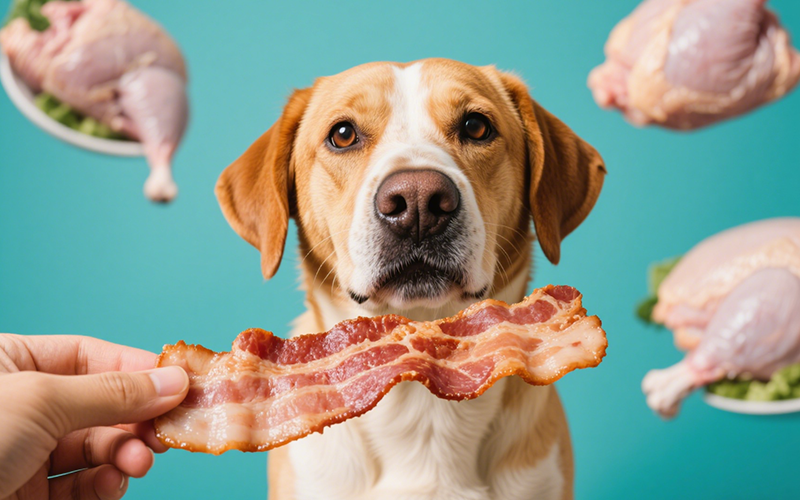Can Dogs Eat Turkey Bacon? Here's What You Need to Know
- 10 Apr 2025 15:00
Turkey bacon is often considered a healthier alternative to traditional pork bacon, but is it safe for your dog? While it may seem like a tasty treat for your furry friend, there are a few important factors to consider before feeding your dog turkey bacon.

Why Turkey Bacon Might Not Be the Best for Dogs ❌
High in Sodium 🧂
Just like regular bacon, turkey bacon can be high in sodium. Excessive salt intake is not safe for dogs and can lead to salt poisoning. Symptoms of salt poisoning include vomiting, diarrhea, excessive thirst, and in severe cases, seizures. High sodium levels can also strain your dog’s kidneys over time.Fat Content 🍔
Turkey bacon is still fatty, even if it's marketed as a healthier option compared to pork bacon. A high-fat diet can contribute to obesity, pancreatitis (inflammation of the pancreas), and digestive upset in dogs. Too much fat can also lead to chronic health issues.Preservatives and Additives 🧴
Most commercially produced turkey bacon contains preservatives and additives, such as nitrates or nitrites, which help preserve the meat. These chemicals can be harmful to dogs when consumed in large amounts and may lead to digestive issues or other health concerns.Spices and Flavorings 🌶️
Turkey bacon can sometimes be seasoned with spices like garlic, onion powder, or pepper. Garlic and onions are toxic to dogs and can cause serious health issues, including damage to red blood cells and gastrointestinal upset. Even small amounts of these seasonings can be harmful to your pet.
What to Do If Your Dog Eats Turkey Bacon 🍽️
If your dog sneaks a bite of turkey bacon, there’s no need to panic, but it’s important to monitor them closely for any signs of discomfort, such as:
Vomiting or diarrhea
Excessive thirst or urination
Lethargy or loss of appetite
Abdominal pain or bloating
If your dog eats a significant amount of turkey bacon or exhibits any of the symptoms above, it’s best to contact your veterinarian for advice.
Healthier Alternatives to Turkey Bacon 🥓
If you want to treat your dog to something special without the risks of turkey bacon, here are some safer alternatives:
Lean, Cooked Chicken or Turkey 🍗
Plain, unseasoned chicken or turkey is a great source of lean protein for dogs. You can cook it yourself or purchase pre-cooked options, but always make sure it’s free of seasoning, especially onion or garlic.Carrot Sticks 🥕
Carrots are a low-calorie, nutritious snack that’s great for dogs. They’re high in fiber and vitamins, and their crunchy texture is perfect for keeping your dog’s teeth clean.Dog-Specific Jerky 🐾
If your dog loves a chewy treat, consider giving them dog-safe jerky. Look for jerky treats that are made with real meat and are free of harmful preservatives, spices, or additives.Low-Sodium, Cooked Bacon 🥓
If you absolutely want to share bacon with your dog, opt for low-sodium, unseasoned bacon in moderation. This is a safer option than traditional bacon, though it should still be offered sparingly to avoid health issues.Sweet Potato Chews 🍠
Sweet potatoes are a healthy and delicious snack for dogs. They are rich in fiber, vitamins, and antioxidants, and are much healthier than processed meats.
How PettureX Can Help 🧠
If you're unsure about what foods are safe for your dog, PettureX can provide helpful advice. With 24/7 online consultations and pet image recognition, PettureX allows you to quickly check if a specific food or treat is safe for your pet. It’s a great resource for dog owners looking to make informed decisions about their pets’ diets.
Conclusion: Can Dogs Eat Turkey Bacon? ❌
Turkey bacon should not be a regular treat for your dog. While it might seem like a healthier alternative to regular bacon, its high sodium content, fatty nature, and the presence of preservatives and seasonings make it a less-than-ideal choice. If you want to treat your dog, stick to lean meats or healthier snacks like carrots or sweet potatoes.
For any questions about your dog’s diet, don’t hesitate to consult PettureX, your friendly pet health assistant, for advice. 🐶💚
Keep your dog happy and healthy by choosing safer, more nutritious treats! Reach out to PettureX for guidance anytime!
Related

Why is Regular Dog Grooming So Important?
- 21 Jun 2025
Can Dogs Eat Kiwis? A Vet-Approved Guide to This Fuzzy Fruit
- 10 Jun 2025
Can Dogs Eat Curry? Unpacking Risks, Benefits, and Safe Alternatives for Your Canine Companion
- 3 Jun 2025
Can Dogs Eat Cooked Carrots? A Crunchy & Colorful Canine Query!
- 29 May 2025
Can Dogs Eat Cooked Cabbage? Unveiling the Crunchy Truth for Your Canine!
- 29 May 2025
Can Dogs Eat Citrus? Peeling Back the Zesty Truth for Your Pup!
- 28 May 2025
Can Dogs Eat Cinnamon Applesauce (A Little Bit)? The Sweet and Spicy Truth!
- 28 May 2025
Can Dogs Eat Chorizo? Sizzling a Warning for Your Furry Friend!
- 27 May 2025
Can Dogs Eat Chili? A Spicy Topic for Canine Consumption!
- 27 May 2025
Can Dogs Eat Raw Chicken? Unveiling the Risks and Realities
- 26 May 2025
